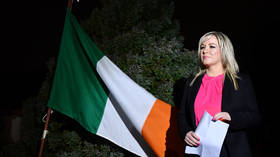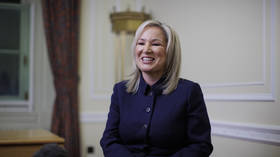New Northern Irish leader predicts vote on leaving UK

Michelle O’Neill, the first Irish nationalist to have ever been appointed as leader of Northern Ireland, has said that she anticipates a referendum on Irish unity to take place within the next 10 years.
In an interview with Sky News on Sunday, O’Neill noted that her campaign was based on being the “first minister for all.”
“I am somebody who wants to be a unifier. I am somebody who wants to bring people together,” she stressed.
When asked whether she agrees with the statement of her party leader Mary Lou McDonald, that a United Ireland is “within touching distance” as opposed to “decades” away, O’Neill said that she believes that Northern Ireland is witnessing “a decade of opportunity.”
“There are so many things that are changing all the old norms: the nature of the state, the fact that a nationalist republican was never supposed to be first minister. This all speaks to that change.”
Under the terms of the Good Friday Agreement signed between the UK and Irish governments in 1998 to end decades of sectarian violence, the secretary of state for Northern Ireland should call for a border poll (a referendum on Irish unification) if “a majority of those voting would express a wish” that Northern Ireland “should leave the UK and join a united Ireland.”
A command paper signed by the rival Democratic Unionist Party (DUP) last month outlined that the region’s future in the UK will be secure for decades and that there is “no realistic prospect of a border poll.” However, O’Neill said that she would “absolutely contest what the British government has said in the document.”
O’Neill, the vice president of the nationalist Sinn Fein party, won the election on Saturday. She said the victory “represents a new dawn” for Northern Ireland and stated that her goal was to achieve a united Ireland.
O’Neill had served as first minister-designate since May 2022, when the pro-united Ireland group emerged as the largest party in the 90-seat Northern Ireland Assembly (Stormont) following elections. However, O’Neill has been blocked from taking office by the DUP, which boycotted the assembly in protest over post-Brexit trading rules. The party said the trade restrictions undermined the region’s relationship with Britain, effectively crippling the legislature, which relies upon a power-sharing agreement to function.
Prior to O’Neill, there had been 11 consecutive unionist leaders at the head of Northern Ireland’s government since Stormont was established 103 years ago.
Sinn Fein has the stated goal of achieving a united Ireland, whereas the DUP wants it to remain part of the UK. A referendum on Irish reunification can only be held at the discretion of the British government.













